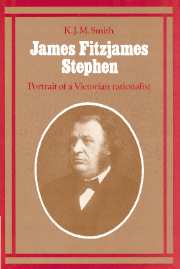Book contents
- Frontmatter
- Contents
- Preface
- 1 EARLY IMPRESSIONS: SIR JAMES, ETON AND CAMBRIDGE
- 2 A CONTROVERSIALIST IN THE MAKING: LITERARY CRITICISM AND LEADER-WRITING
- 3 A SCIENCE OF CRIMINAL LAW
- 4 ‘LAW LIVING AND ARMED’ – THE MECHANISM OF ENFORCEMENT
- 5 THE THREAT OF ‘HOOFS AND HOBNAILS’
- 6 INDIA AND THE IMPERIAL ETHIC
- 7 LIBERTY, EQUALITY, FRATERNITY: REFUTATION AND APOLOGIA
- 8 RATIONALISM'S BURDEN
- 9 THE BENCH AND BEYOND
- Notes
- Bibliography
- Index
2 - A CONTROVERSIALIST IN THE MAKING: LITERARY CRITICISM AND LEADER-WRITING
Published online by Cambridge University Press: 30 September 2009
- Frontmatter
- Contents
- Preface
- 1 EARLY IMPRESSIONS: SIR JAMES, ETON AND CAMBRIDGE
- 2 A CONTROVERSIALIST IN THE MAKING: LITERARY CRITICISM AND LEADER-WRITING
- 3 A SCIENCE OF CRIMINAL LAW
- 4 ‘LAW LIVING AND ARMED’ – THE MECHANISM OF ENFORCEMENT
- 5 THE THREAT OF ‘HOOFS AND HOBNAILS’
- 6 INDIA AND THE IMPERIAL ETHIC
- 7 LIBERTY, EQUALITY, FRATERNITY: REFUTATION AND APOLOGIA
- 8 RATIONALISM'S BURDEN
- 9 THE BENCH AND BEYOND
- Notes
- Bibliography
- Index
Summary
Stephen once confessed that for him solitary confinement would have meant ‘scratch[ing] newspaper articles on the wall with a nail’; indeed, if his brother is to be believed, it gave him the same pleasure ‘that other men derive from dramdrinking’. Much the same sentiment reveals itself in the claim that ‘if my body ever had a call to anything by the voices of nature, I have a call to journalism’ Running from early post-Cambridge days through to Stephen's last years, journalism was a continuous occupation paralleling the various phases of his legal career. A prodigious number of articles and reviews document an intellectual and personal development over, even by Victorian standards, an impressively wide range of interests taking in political science, history, law, philosophy, religion and literature; in Carlyle's estimate, someone ‘with a huge heavy stroke of work in him’. Journalism provided the first important public outings for a cast of mind greatly taken with empirically based rationalism – making reason the regulator of beliefs, actions and opinions, so much the hallmark of Benthamite utilitarianism. For Stephen the great practical significance of journalism, and, above all of his association with the Saturday Review and Pall Mall Gazette, was the role it performed in establishing him as a coming man.
- Type
- Chapter
- Information
- James Fitzjames StephenPortrait of a Victorian Rationalist, pp. 9 - 43Publisher: Cambridge University PressPrint publication year: 1988

